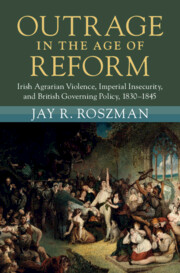 Outrage in the Age of Reform
Outrage in the Age of Reform Agrarian Violence and Irish Claims to Counter-Sovereignty
Published online by Cambridge University Press: 15 September 2022
On either 31 December 1838 or 1 January 1839, unknown assailants shot Lord Norbury while he walked part of his estate with his steward in Durrow, King’s County. Newspaper accounts did not know what to make of the event. Norbury held a fairly good reputation in the surrounding area, and as the conservative Mail noted, he was a ‘resident landlord [who] dispensed the rites of hospitality with a munificent hand’, and ‘exercised towards his tenants and the poor all kindliness and benevolence which their relative positions could demand’. While certainly less grandiloquent, even the nationalist Dublin Pilot conceded that Norbury’s tenants had little motive to attack him, as they had ‘always heard of him as an excellent landlord’. The Pilot, however, did note that peasants often targeted their landlords on account of what the newspaper called ‘the landlord[s’] exterminating war’, which pushed tenants off the land they occupied, inducing them to respond through modes of resistance that included assassination. Whig government officials feared the effects Norbury’s murder would have on Irish society and how it might embolden their Tory opponents to draw negative conclusions about the state of Ireland.
To save this book to your Kindle, first ensure [email protected] is added to your Approved Personal Document E-mail List under your Personal Document Settings on the Manage Your Content and Devices page of your Amazon account. Then enter the ‘name’ part of your Kindle email address below. Find out more about saving to your Kindle.
Note you can select to save to either the @free.kindle.com or @kindle.com variations. ‘@free.kindle.com’ emails are free but can only be saved to your device when it is connected to wi-fi. ‘@kindle.com’ emails can be delivered even when you are not connected to wi-fi, but note that service fees apply.
Find out more about the Kindle Personal Document Service.
To save content items to your account, please confirm that you agree to abide by our usage policies. If this is the first time you use this feature, you will be asked to authorise Cambridge Core to connect with your account. Find out more about saving content to Dropbox.
To save content items to your account, please confirm that you agree to abide by our usage policies. If this is the first time you use this feature, you will be asked to authorise Cambridge Core to connect with your account. Find out more about saving content to Google Drive.